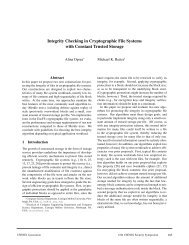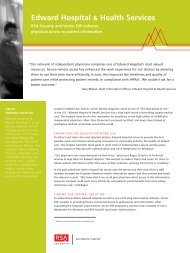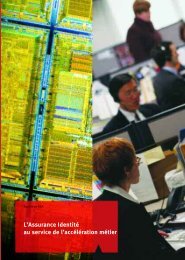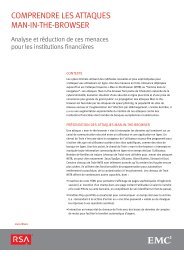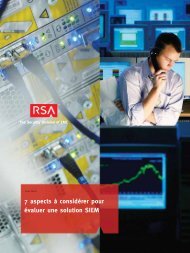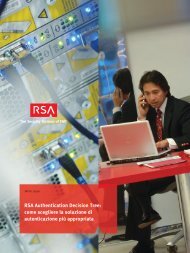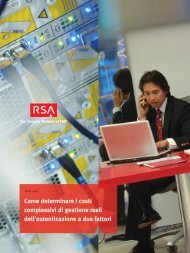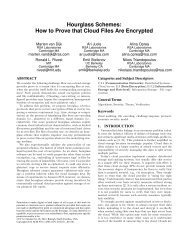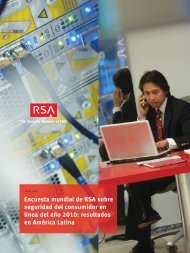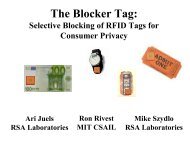Governance of Enterprise Security: CyLab 2012 Report How ... - RSA
Governance of Enterprise Security: CyLab 2012 Report How ... - RSA
Governance of Enterprise Security: CyLab 2012 Report How ... - RSA
Create successful ePaper yourself
Turn your PDF publications into a flip-book with our unique Google optimized e-Paper software.
est practices for board involvement with respect to IT governance that strengthen the security posture <strong>of</strong> a<br />
company.<br />
When asked whether their boards receive information or are involved in activities related to these best<br />
practices, respondents indicated that boards are only occasionally, rarely or never engaged:<br />
Carnegie Mellon <strong>CyLab</strong><br />
!<br />
! Review annual budgets. Fifty-three percent (53%) <strong>of</strong> respondents said their board rarely or never<br />
reviewed and approved annual budgets for privacy and IT security programs; 9% said they<br />
occasionally did. Only 31% <strong>of</strong> respondents indicated that their boards regularly reviewed and<br />
approved these budgets.<br />
! Review roles and responsibilities. Fifty-six percent (56%) <strong>of</strong> respondents indicated their board rarely<br />
or never reviewed and approved roles and responsibilities <strong>of</strong> personnel responsible for privacy and<br />
security risks; an additional<br />
18% said they occasionally<br />
did. Only 19% said they<br />
regularly reviewed privacy<br />
and security roles and<br />
responsibilities.<br />
! Review top-level policies.<br />
Forty-one percent (41%)<br />
<strong>of</strong> respondents said their<br />
board rarely or never<br />
reviewed and approved<br />
top-level policies regarding<br />
privacy and security risks;<br />
an additional 28% said<br />
they occasionally did. Only one-quarter (25%) <strong>of</strong> the respondents said they regularly reviewed toplevel<br />
privacy and security policies.<br />
! Receive reports on privacy and security risks. Twenty-six percent (26%) <strong>of</strong> respondents said their<br />
board rarely or never received reports from senior management regarding privacy and IT security<br />
risks; an additional 33% said they occasionally got such reports. Thirty-nine percent (39%) said they<br />
regularly received reports on privacy and IT security risks. These results were slightly better than the<br />
2008 results (62% occasionally or rarely received reports and 15% never did).<br />
! Receive reports on security breaches or loss <strong>of</strong> data. Thirty percent (30%) <strong>of</strong> respondents said their<br />
board rarely or never reviewed reports <strong>of</strong> security breaches or incidents involving the disclosure <strong>of</strong><br />
personally identifiable information or theft <strong>of</strong> corporate data; another 30% said they occasionally<br />
received such reports. Thirty-one percent (31%) <strong>of</strong> the respondents said their boards regularly<br />
reviewed these reports.<br />
! Review annual computer security program assessments. Thirty-six (36%) <strong>of</strong> respondents said their<br />
board rarely or never reviewed annual security program assessments; another 20% said they<br />
occasionally did. Only 35% <strong>of</strong> the respondents said they regularly reviewed such reports.<br />
There were only modest gains in each <strong>of</strong> the first four areas (breach reports and security program assessments<br />
were not asked for in the 2008 and 2010 surveys), particularly in regularly receiving reports from senior<br />
7R!



